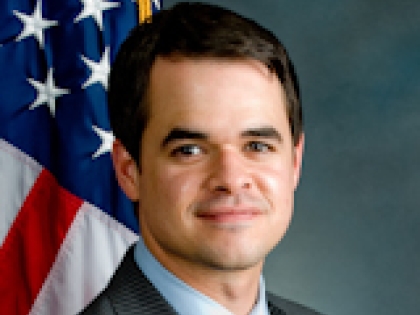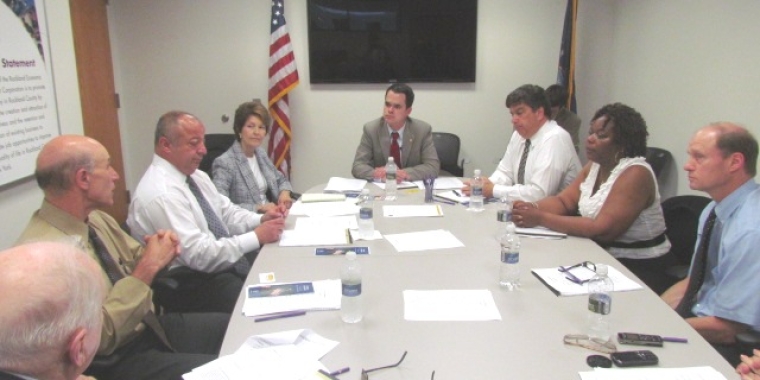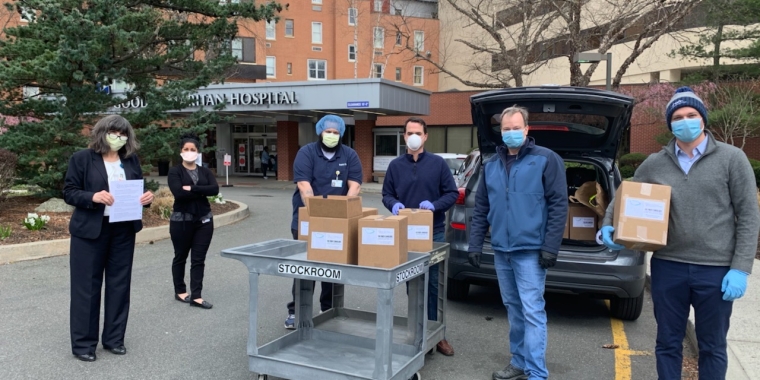
Senator Carlucci Hosts Veterans ThoughtRaiser in Pearl River to Spur Job Creation
David Carlucci
May 29, 2012

PEARL RIVER, NY – Senator David Carlucci (D-Rockland/Orange) today hosted his very first Veterans ThoughtRaiser, a policy focused roundtable geared towards generating real ideas and solutions to increase employment opportunities among our returning veterans from Iraq and Afghanistan.
The theme of the Senator’s ThoughtRaiser – “Getting Our Vets Back to Work” – explored ways in which the federal and state government can actively partner together, streamline redundancy and encourage agency cooperation, and discuss a multitude of issues and bills currently being debated in the New York State legislature. The roundtable also explored ways in which businesses can take advantage of tax incentives for hiring returning veterans.
“With droves of veterans returning home while our economy is still in recovery, we must find innovative ways to help these brave warriors transition back into the workforce,” said Senator Carlucci. “We need to find out which policies, legislation or programs veterans feel New York State needs to implement in order to deal with the challenging environment that they and their families are facing today.”
Business groups and companies were invited to take part in the two hour-long discussion, including Rockland Toyota, Accelerated Advertising, Rockland Economic Development Corporation, and the Council of Industry.
In addition, veterans and veteran advocacy organizations shared their thoughts on how to deal with the growing need among veterans to access mental healthcare and education opportunities. These included the Women Veterans Association of the Hudson Valley, New City resident and veteran Bill Mahan, and Liz Kallen, a Program Manager with the Rockland Economic Development Corporation.
In January 2012, the Iraq and Afghanistan Veteran’s Association asked its members approximately 120 quantitative and qualitative questions—and over 4,000 Iraq and Afghanistan veterans responded to the survey. Not surprisingly, the survey found that employment, mental health, disability benefits, health care, education (including the G.I. Bill), suicide and families — in that order — were the top concerns of the more than 4,200 members who responded. Some highlights of the survey results were:
Employment and Education
- IAVA members’ unemployment rate was 16.7%. This is significantly higher than the 12.1% average unemployment rate for Iraq - and - Afghanistan-era veterans in 2011 as reported by the Bureau of Labor Statistics.
- Among the unemployed, 24% were unable to find a job that matches their skill level and 11% were unable to find a job that matches their education level.
- Almost half (49%) of unemployed members did not feel that employers were open to hiring veterans.
- Almost 30% of their members are using the New GI Bill. Among those who are not, almost 50% plan to use it or pass it to a dependent.
- Most rate their experience with the New GI Bill as excellent (35%) or good (41%), but 42% have found the processing slow and 34% had financial problems because of delays.
Mental Health
- Two-thirds of their members do not think troops and veterans are getting the care they need for mental health injuries, including combat-related stress or military sexual trauma.
- Thirty-seven percent of their members personally know someone they served with or another Iraq or Afghanistan veteran who has committed suicide.
- Ninety-six percent think counselors that understand military life and culture are very important (77%) or somewhat important (19%) in provision of mental health care.
- Almost one-third (31%) divorced or broke up with a long-term partner as a result of deployment and the return home. A quarter of those with children said their child had emotional problems (25%) or had problems in school (24%).
- Sixty percent do not think the military/Department of Defense is doing a good job of reaching out to troops and veterans regarding their mental health injuries and care.
- Less than half (49%) think the VA is doing a good job of reaching out to troops and veterans regarding their mental health injuries and care. Nearly 69% didn’t know or guessed incorrectly the name of the current Secretary of the Department of Veterans Affairs.
The roundtable discussed a variety of questions to help solve many of the employment challenges facing a new generation of veterans. This included a discrimination perception among veterans by potential employers, strict certification requirements states maintain for various professional occupations, and ways to better communicate and access available benefits through the New York State Department of Labor and the New York State Division of Veteran Affairs.
Other issues focused on receiving adequate mental healthcare and educational services, including what types of barriers exist facing veterans and their families, what types of programs are available at regional offices throughout the state, ways to identify which educational benefits are currently available, and ways to identify fraud among private educational institutions.
Among the suggestions offered from this meeting included establishing a set of best practices for resource directories that provide local information towards veterans, an eventual Veterans Resources Fair to bring together state agencies and non-profit organizations to assist with career development and support, and establishing a set of best practices for hiring veterans that can be adopted by all public and private organizations.
The senator also called for passing critical legislation at the state level. This includes passing:
- Tax credit legislation (S.6190), dubbed the Hire Veterans Now Act, which would provide a tax credit to an employer for hiring and retaining a qualified veteran seeking employment
- Co-Sponsored legislation by Senator Carlucci (S.2423) that would provide preference in state contracts for service disabled veteran owned small businesses
- Veterans Mental Health and Chemical Dependency Act, which would require the New York State Veterans Affairs Commission to develop and update a plan to improve outreach, assessment, and care for veterans and their families who are experiencing mental health issues.
# # #
Photo: Senator David Carlucci convenes his first Veterans ThoughtRaiser roundtable in Pearl River among business leaders and veterans at Pearl River’s Rockland Economic Development Corporation Headquarters.
Share this Article or Press Release
Newsroom
Go to NewsroomSenator Carlucci & Northeast Face Shield Project Deliver PPE
April 15, 2020


